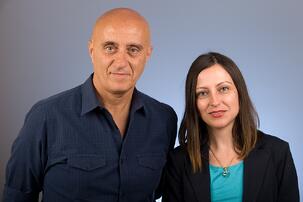
Your body's circadian clock is responsible for making sure you stay healthy, by regulating metabolism and carrying out internal housekeeping chores on a steady 24-hour schedule. About 15% of genes are controlled by your bodily clock, including some important ones in your intenstines that keep infectious bacteria like salmonella in check. Dr. Paolo Sassone-Corsi is a professor of biological chemistry at the UC Irvine School of Medicine and Director of UCI's Center for Epigenetics and Metabolism. Together with his colleague, microbiologist Manuela Raffatellu of UCI's Institute for Immunology, the Irvine bio research team has recently published an article in PNAS revealing how the immune system, specifically as it works in your intestinal track, is strongly directed by circadian rhythms. Upset that biological timing and you put yourself at greater risk of getting sick.
[Drs. Sassone-Corsi and RAffatellu, courtesy of Jocelyn Lee / University Communications at UCI]
Tags:
2014,
CA,
2013,
University of California Irvine,
Immunology,
epigenetics,
Southwest,
California,
University of California,
Immune System,
BioResearch Product Faire Event,
Irvine,
UCI,
biological clock
One of the reasons cancer is so successful and difficult to treat is that it uses the body's own systems to proliferate, thrive, and hide from attack. Bioresearch scientists out to target cancer are taking a similar approach, building tiny bio-vehicles for locating tumors that reach their destination without setting off a massive immune system alarm or flooding the whole body with toxic chemicals. A team of biochemists at the University of California San Diego led by Dr. Nathan Gianneschi has developed a nanoparticle that assumes a benign shape to travel covertly through the blood system, then, recognizing a tumor, reassembles via an enzymatic cue into a net to attach itself to the cancerous target.
Tags:
2014,
CA,
University of California San Diego,
2013,
Nanobiotechnology,
cancer research,
Southwest,
California,
University of California,
San Diego,
SDVS,
BioResearch Product Faire Event,
UCSD,
Biotechnology Vendor Showcase
 Researchers at the Broad Center of Regeneration Medicine and Stem Cell Research on the Parnassus Campus of the University of California San Francisco have just published the results of two related studies involving differentiated brain cells transplanted into mice. In one case, the cells were human brain cells integrated successfully into a mouse brain; in the other, epileptic mice were cured with specialized mouse brain cells. In both studies the differentiated cells were a type of interneuron progenitor called medial ganglionic eminence (MGE) cells. Unlike other brain stem cells that can turn into any number of specialized cells, these differentiated MGE cells have a specific function, which is to inhibit signaling in overactive nerve circuits. These experiments hold promise for future treatment of neurological disorders like Parkinson’s disease, Alzheimer’s, epilepsy, and the chronic pain and spasticity caused by spinal cord injury.
Researchers at the Broad Center of Regeneration Medicine and Stem Cell Research on the Parnassus Campus of the University of California San Francisco have just published the results of two related studies involving differentiated brain cells transplanted into mice. In one case, the cells were human brain cells integrated successfully into a mouse brain; in the other, epileptic mice were cured with specialized mouse brain cells. In both studies the differentiated cells were a type of interneuron progenitor called medial ganglionic eminence (MGE) cells. Unlike other brain stem cells that can turn into any number of specialized cells, these differentiated MGE cells have a specific function, which is to inhibit signaling in overactive nerve circuits. These experiments hold promise for future treatment of neurological disorders like Parkinson’s disease, Alzheimer’s, epilepsy, and the chronic pain and spasticity caused by spinal cord injury.
Tags:
2014,
CA,
University of California San Francisco,
2013,
University of California San Francisco Mission Bay,
University of California San Francisco Parnassus,
Parkinson's Disease Research,
Southwest,
California,
University of California,
brain research,
San Francisco,
SFVS,
Biotechnology Vendor Showcase,
UCSF,
Parnassus,
Mission Bay
Bioengineers at the University of California San Diego have come up with a novel way of removing dangerous toxins from the bloodstream using biomimetic nanosponges. These tiny clean-up particles work by posing as red blood cells, which serves both to evade the body's immune system response to foreign invaders and to attract the toxins to themselves instead of to actual red blood cells. When the toxins have all attached themselves to the nanosponges, they are processed out through the liver without harming the body. The research into this promising therapy comes out of the Zhang Lab in the Jacobs School of Engineering, where in 2011 they pioneered the red blood cell disguise technology for cloaking cancer drug cocktails, allowing the drugs much more time in the body to target diseased cells. Dr. Liangfang Zhang is also on the research faculty of the UCSD Moores Cancer Center.
Tags:
2014,
CA,
University of California San Diego,
2013,
nanoparticle,
Nanobiotechnology,
nanotechnology,
Nanoscience,
Southwest,
California,
University of California,
Cell Research,
San Diego,
SDVS,
UCSD,
Biotechnology Vendor Showcase
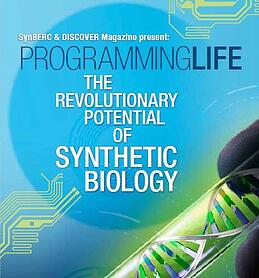 Synthetic biology is the application of engineering principles to altering components of biological systems, like genes and cells, towards creating new and revised living things (watch the video below for an introduction). It's arguably the most radical, cutting-edge laboratory science field today, and one that calls on its scientists to grapple with ethics as well as biotechnology. At the forefront of this life science revolution is the University of California Berkeley-led consortium SynBERC: the Synthetic Biology Engineering Research Center, with partner colleagues at UCSF, Stanford, MIT, and Harvard. Just this week, principal synbio investigators from these institutions came together with industry scientists and ethicists for a symposium on the UCB campus titled Programming Life: the revolutionary potential of synthetic biology, co-sponsored by SynBERC and Discover Magazine. Whether we are going to continue down the road of reengineering life was not the question so much as how we will go about that delicate task and what the implications and promises are of such a bold project.
Synthetic biology is the application of engineering principles to altering components of biological systems, like genes and cells, towards creating new and revised living things (watch the video below for an introduction). It's arguably the most radical, cutting-edge laboratory science field today, and one that calls on its scientists to grapple with ethics as well as biotechnology. At the forefront of this life science revolution is the University of California Berkeley-led consortium SynBERC: the Synthetic Biology Engineering Research Center, with partner colleagues at UCSF, Stanford, MIT, and Harvard. Just this week, principal synbio investigators from these institutions came together with industry scientists and ethicists for a symposium on the UCB campus titled Programming Life: the revolutionary potential of synthetic biology, co-sponsored by SynBERC and Discover Magazine. Whether we are going to continue down the road of reengineering life was not the question so much as how we will go about that delicate task and what the implications and promises are of such a bold project.
Tags:
2014,
CA,
2013,
University of California Berkeley,
biofuels,
synthetic biology,
Southwest,
California,
University of California,
genetic engineering,
Berkeley,
BioResearch Product Faire Event,
Research,
Berkeley Labs,
UCBerk,
UC Berkley
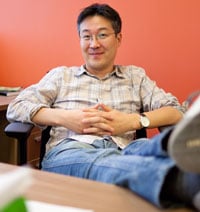 The tighter funding gets, the more likely it is that young investigators pursuing big ideas will get passed over and science grant money will stay with safer, more established projects. Fortunately there are exceptions to that general rule, including a new program established by the Paul G. Allen Family Foundation specifically to support select pioneering research projects that aim to unlock fundamental questions in biology. They recently awarded investigators from 5 prestigious US universities a total of $7.5M to pursue basic questions about the origins and mechanisms of cellular behavior. One of those 5 Distinguished Investigator awards, for $1.6M, is going to quantitative biologist and recent hire Suckjoon Jun, who works in physics and molecular biology at the University of California San Diego. His project title is "Cell-size control and its evolution at the single-cell level," and includes developing methods to perform long-term directed single-cell evolution experiments, as well as single-cell on-chip manipulation, sequencing, and mathematical modeling.
The tighter funding gets, the more likely it is that young investigators pursuing big ideas will get passed over and science grant money will stay with safer, more established projects. Fortunately there are exceptions to that general rule, including a new program established by the Paul G. Allen Family Foundation specifically to support select pioneering research projects that aim to unlock fundamental questions in biology. They recently awarded investigators from 5 prestigious US universities a total of $7.5M to pursue basic questions about the origins and mechanisms of cellular behavior. One of those 5 Distinguished Investigator awards, for $1.6M, is going to quantitative biologist and recent hire Suckjoon Jun, who works in physics and molecular biology at the University of California San Diego. His project title is "Cell-size control and its evolution at the single-cell level," and includes developing methods to perform long-term directed single-cell evolution experiments, as well as single-cell on-chip manipulation, sequencing, and mathematical modeling.
Tags:
2014,
CA,
University of California San Diego,
2013,
cell biology,
Southwest,
California,
University of California,
Cell Research,
San Diego,
SDVS,
Funding,
UCSD,
Biotechnology Vendor Showcase
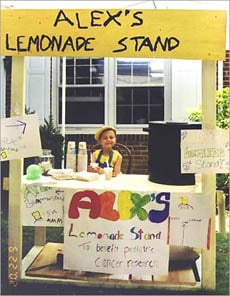 Since its first lemonade stand was set up in 2000 by a little girl with cancer, the Alex's Lemonade Stand Foundation (ALSF) has raised over $60M to support pediatric cancer research at institutions across the United States. That's a lot of lemonade. While lemonade stands are still a staple of the organization's activities, celebrity support and large fund raising events like the recent "Lemon Ball" (which raised a record $825K) allow ALSF to leverage the kind of funds that really make a difference. In a recent round of funding awards, the University of California San Francisco's Benioff Children's Hospital was named a Center of Excellence by the foundation and given $1.75M to speed translational research programs and training over the next five years. Chief investigator on the grant is Dr. Katherine Matthay, chief of pediatric oncology at Benioff. She says of the ALSF award in a recent news release:
Since its first lemonade stand was set up in 2000 by a little girl with cancer, the Alex's Lemonade Stand Foundation (ALSF) has raised over $60M to support pediatric cancer research at institutions across the United States. That's a lot of lemonade. While lemonade stands are still a staple of the organization's activities, celebrity support and large fund raising events like the recent "Lemon Ball" (which raised a record $825K) allow ALSF to leverage the kind of funds that really make a difference. In a recent round of funding awards, the University of California San Francisco's Benioff Children's Hospital was named a Center of Excellence by the foundation and given $1.75M to speed translational research programs and training over the next five years. Chief investigator on the grant is Dr. Katherine Matthay, chief of pediatric oncology at Benioff. She says of the ALSF award in a recent news release:
Tags:
2014,
CA,
University of California San Francisco,
2013,
University of California San Francisco Mission Bay,
University of California San Francisco Parnassus,
cancer research,
Southwest,
California,
University of California,
Pediatric Cancer Research,
San Francisco,
SFVS,
BioResearch Product Faire Event,
Funding,
San Francisco cancer research,
Biotechnology Vendor Showcase,
UCSF,
Parnassus,
Mission Bay,
Benioff Children's Hospital
The Brain Activity Map project could be the next big federal life science research endeavor, with no less a goal than the mapping of the entire living brain and all its neuronal activity. Like the Human Genome Project of the 90's, the not insignificant financial outlay is being presented as an investment that will net even bigger returns, both in terms of new technology and a vastly increased understanding of the mind. President Obama is expected to include the multi-billion dollar, decade-long funding in his upcoming budget proposal, and neuroscience research was a topic he addressed specifically in his recent State of the Union address.
Tags:
2014,
CA,
University of California San Diego,
2013,
Northeast,
University of California Berkeley,
New York,
Columbia University,
Southwest,
California,
University of California,
Berkeley,
Neuroscience,
San Diego,
SDVS,
Columbia,
BioResearch Product Faire Event,
Funding,
UCSD,
NY,
NIH,
Columbia University Medical Center,
Biotechnology Vendor Showcase,
Berkeley Labs,
UCBerk
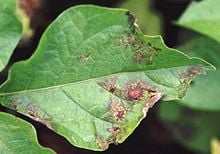 Plant pathogens like the one that led to the notorious Irish Potato Famine of the 1840's are still the subject of intense research at institutions like the University of California Riverside, as the battle continues between mega-crop farmers and diseases that have learned to infiltrate the plant’s immune system. Just what the genetic mechanism is that allows for that infiltration has remained elusive until recently. Studying the notorious oomycete pathogen Phytophthora in its multiple forms, UC Riverside researchers have identified a crucial step in the disease attack of the cell, namely the activity of virulence proteins in blocking RNA silencing pathways, which leads to immune system compromise. The role of RNA silencing as an important immune component is a new research direction and one that is being pioneered at UCR.
Plant pathogens like the one that led to the notorious Irish Potato Famine of the 1840's are still the subject of intense research at institutions like the University of California Riverside, as the battle continues between mega-crop farmers and diseases that have learned to infiltrate the plant’s immune system. Just what the genetic mechanism is that allows for that infiltration has remained elusive until recently. Studying the notorious oomycete pathogen Phytophthora in its multiple forms, UC Riverside researchers have identified a crucial step in the disease attack of the cell, namely the activity of virulence proteins in blocking RNA silencing pathways, which leads to immune system compromise. The role of RNA silencing as an important immune component is a new research direction and one that is being pioneered at UCR.
Tags:
2014,
CA,
2013,
University of California Riverside,
genome research,
Southwest,
California,
University of California,
Plant science,
BioResearch Product Faire Event,
Funding,
Riverside,
NSF,
Southwest Region,
UCR
Tags:
2014,
CA,
University of California San Diego,
2013,
Southwest,
California,
University of California,
Autism,
Neuroscience,
San Diego,
SDVS,
UCSD,
UC San Diego,
Research,
La Jolla,
Biotechnology Vendor Showcase,
Southwest Region





 The tighter funding gets, the more likely it is that young investigators pursuing big ideas will get passed over and science grant money will stay with safer, more established projects. Fortunately there are exceptions to that general rule, including a new program established by the
The tighter funding gets, the more likely it is that young investigators pursuing big ideas will get passed over and science grant money will stay with safer, more established projects. Fortunately there are exceptions to that general rule, including a new program established by the 
 Plant pathogens like the one that led to the notorious Irish Potato Famine of the 1840's are still the subject of intense research at institutions like the University of California Riverside, as the battle continues between mega-crop farmers and diseases that have learned to infiltrate the plant’s immune system. Just what the genetic mechanism is that allows for that infiltration has remained elusive until recently. Studying the notorious oomycete pathogen Phytophthora in its multiple forms, UC Riverside researchers have identified a crucial step in the disease attack of the cell, namely the activity of virulence proteins in blocking RNA silencing pathways, which leads to immune system compromise. The role of RNA silencing as an important immune component is a new research direction and one that is being pioneered at UCR.
Plant pathogens like the one that led to the notorious Irish Potato Famine of the 1840's are still the subject of intense research at institutions like the University of California Riverside, as the battle continues between mega-crop farmers and diseases that have learned to infiltrate the plant’s immune system. Just what the genetic mechanism is that allows for that infiltration has remained elusive until recently. Studying the notorious oomycete pathogen Phytophthora in its multiple forms, UC Riverside researchers have identified a crucial step in the disease attack of the cell, namely the activity of virulence proteins in blocking RNA silencing pathways, which leads to immune system compromise. The role of RNA silencing as an important immune component is a new research direction and one that is being pioneered at UCR.